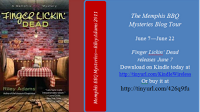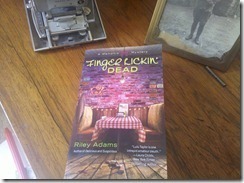Riley Adams's Blog, page 204
May 20, 2011
Getting With the 21st Century
 Overall, I'm feeling pretty smug that I'm adapting to the changing publishing environment.
Overall, I'm feeling pretty smug that I'm adapting to the changing publishing environment.
I have a Kindle. I'm not at all opposed to putting backlist items out as ebooks (I've even got a book in mind for it). I edit my manuscript on my Kindle when I'm on the go. I feel fairly progressive.
But when the Charlotte Observer called me up last week and offered to give me a special price to make the move to an electronic edition of the newspaper, I was practically speechless.
"It's an exact reproduction," the sales representative said soothingly. "Even the ads. It's a PDF.'"
"Uhhhh…" I said.
"When you go out of town, you can still read the Charlotte Observer. You can read it anywhere in the world!"
"Ummm…." I said.
"It's interactive, too. And you can search the archive, make the font size bigger, and you can access it 24/7! And it's a lot less expensive than the print edition."
It all made a lot of sense…I just couldn't do it. But first of all, I asked if I had to do it—was the print edition going under in the immediate future? Because I'd rather read an e-edition of the newspaper than lose my local paper altogether.
It wasn't to the point of the print edition disappearing, thankfully. There's still something very nice about unfolding a newspaper and sipping my coffee while catching up on the news.
But I'm 40---and the representative, laughing a little, said that was the gray area. She said that everyone over 40 was very indignant at the thought of losing the physical, newsprint paper….that everyone under 40 was excited to get the same paper, as an e-edition, for a much lower price than the printed edition.
This is interesting to me, because I think a lot of Kindle users are middle aged and up. But maybe there's a difference between getting a book on a reader and receiving a newspaper that way. I know there's a difference for me. And I'm not sure I want to interact with my newspaper, anyway.
Are there some areas where you're just not wanting to make the switch yet? Or are you fully onboard with the ebook revolution?
May 19, 2011
5 Star Reviews
I was speaking to a group of writers a couple of weeks ago when a question came up about what my opinion of a good review on Amazon was.
I winced, because I knew what the questioner was getting at.
If I were reading a movie review, 3 out of 5 stars means a good movie to me. Maybe it's no Academy Award winner, but it's good entertainment. It's no waste of time to watch. 4 stars seems to mean very good to me…maybe a more complex plot with some top-notch acting. 5 stars? I should be watching Casablanca, Citizen Kane, or The Manchurian Candidate (1962).
Now, if it's Amazon, then it's totally different. Many of the published authors that I know consider anything less than a 5-star review something of a slap in the face. I'm not saying that's right or wrong…I'm just saying that's what I've heard. Of course, none of us feel good about a 1-star or 2-star review, but most authors aren't rejoicing over a 3 or 4 star one, either.
If I were to apply the same rating system to books that I apply to movies, I'd make a book like The Complete Works of Shakespeare a 5 star, The Great Gatsby a 4 star (because it's VERY good, but not really on par with Shakespeare), then I think many of the rest of us would be 3-star-good. Good entertainment… a nice read… good use of a reader's valuable time.
Would I actually use this scale to rate my friends' books? No, I sure wouldn't. I wouldn't have a whole lot of friends left. The way the Amazon scale runs is more like a recommended/not recommended rating—if it's 5 stars, you heartily recommend it. If it's fewer than 5 stars, in the Amazon environment, you're not really recommending the book to others. I'm not saying this is right, but it seems to be what authors and what I think many Amazon readers believe. Amazon could practically switch to a Facebook-esque thumbs up or thumbs down symbol and just cut to the chase, if that's the way we're all treating their ratings.
To me, it looks a little phony to have all 5-star reviews. It has the appearance of being in cahoots with our reviewers. I just don't think that everyone is going to love my book. I'd love it if everyone did, and I deeply appreciate the readers who feel that way, but the reality is that different readers enjoy different types of books. Some might love my book, some might think it was pretty good, some might put it down and pick up a thriller instead. I know I prefer some types of books over others.
The emphasis on a standing ovation review was driven home to me on Wednesday at the pharmacy when I was asked by my pharmacist to call a number on my receipt and complete a survey to be entered in a drawing. "But please," he said, "don't give us any fewer than 5 stars. Anything less than that is a strike against us, in Corporate's eyes. If you're only somewhat satisfied, please just don't fill out the survey at all."
It left me with a icky feeling that someone could suffer negative consequences from an overall favorable review of their service.
What do you think? Has Amazon changed the way we think about book rating and review? What's a good review on Amazon? Are you hesitant to give fewer than five stars for a book?
May 18, 2011
Characters Who Grow on You
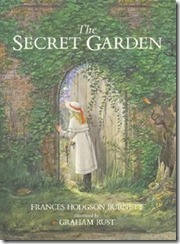 When I first took my now-14 year old son to kindergarten, I didn't completely understand the elementary school carpool line. Actually, I didn't understand it at all. And there seemed to be a lot of rules that I wasn't aware of—where to turn in, which entrance was for what grade, where it was acceptable to drop off your child, where it wasn't.
When I first took my now-14 year old son to kindergarten, I didn't completely understand the elementary school carpool line. Actually, I didn't understand it at all. And there seemed to be a lot of rules that I wasn't aware of—where to turn in, which entrance was for what grade, where it was acceptable to drop off your child, where it wasn't.
My very first day in the carpool line, I pulled up to the curb by the sidewalk that led into the school. But I didn't pull up at the right place. As my son got out of the car, the teaching assistant—a stern-looking older lady—bent to look through my passenger window and fussed, "Excuse me! You'll need to pull up allllll the way up here in your car. That way more cars can pull up behind you! We don't have all day to unload!"
She was very indignant at my carpooling ineptitude. I was indignant, too. Here I was, a kindergarten parent with a baby in the backseat….how the heck was I supposed to know how the crazy carpool line worked?
We'll just say that I started off with a negative impression of this teacher.
Over the years, though, I learned a lot more about the teacher from volunteering at the school. She has an old-fashioned way of phrasing sentences and a dry, sharp wit. She's extremely well-read and sometimes makes obscure literary references that perfectly match whatever situation we're in.
She's now one of my favorite teachers at the school—and I think I like her even better than some other teachers because I so thoroughly disliked her at the beginning.
As a reader, I've felt the same way about characters that have grown on me. Particularly if the protagonist and I both share the negative opinion of the supporting character.
I remember, as a kid, thinking that Ben, the gardener in The Secret Garden was a total grouch. Then, as I reader, I found out with Mary that Ben was friends with a robin, was a real lover of nature, and was excited for Mary to start gardening.
Severus Snape in the Harry Potter series was another character that I detested at first, but then found really grew on me.
So I'm not really talking about a character that changes and becomes more likeable, I'm talking about one who stays the same, but has characteristics that make readers eventually, maybe grudgingly, like them.
I was thinking about this the other day in the carpool line, realizing I wanted to write some more characters that a reader can grow to like…because I've enjoyed reading them so much that I'd love to try my hand at writing one.
Have you read any characters that grew on you? As a writer, have you written any?
May 17, 2011
Building a World From the Ground Up—by Janice Hardy
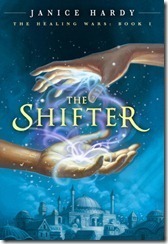 As a fantasy author, creating the worlds my characters inhabit is half the fun. But it can also be a lot of work, because there's so much you need to know to create a whole world – and most of it never even makes it into the book. To make this easier on myself, I like to use real places as a foundation and build my worlds from there.
As a fantasy author, creating the worlds my characters inhabit is half the fun. But it can also be a lot of work, because there's so much you need to know to create a whole world – and most of it never even makes it into the book. To make this easier on myself, I like to use real places as a foundation and build my worlds from there.
For my adventure fantasy, The Shifter, I wanted to create a lakeside Venice, so I started researching the world's biggest lakes. Lake Superior had interesting possibilities, but it was pretty deep and cold, and anyone building a city on a lake would probably need it to be shallow. Lake Tanganyika was an option, but it was too long and skinny for what I had in mind. I wanted my city to have a sense of isolation that only a vast expanse of water could create. Then I found Lake Victoria in Africa. Round, shallow, interesting geographic location—it was perfect.
Now that I had my lake, I researched what plants grew in that area, what people ate, and what kind of animals there were. All the little details that make a world come to life, and things that I could easily grab when I needed a detail for a scene. Fishing would obviously be important, so that would be a large industry and where most of Nya's (my protagonist) odd jobs would come from. In a small city riddled with canals, vehicles would takes up a lot of space, so most people would probably walk. Carriages and horses would be restricted to the very rich or powerful. Instead, boats would likely be used to carry people and goods from one side of the isle to the other. With just a little research I could already see my world coming to life.
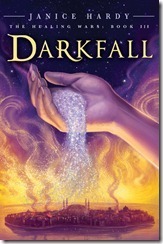 I also found some fun real life details I could use. Like how water hyacinths are a problem around Lake Victoria, because they grow so fast and get caught in boat propellers. This translated into a problem my city of Geveg could have, with plants clogging the canals and boat owners needing someone to yank them out by hand. Sounded like a risky job to me, so why not make it even riskier by adding crocodiles to the mix? People desperate for a job would risk being eaten to pull a few plants now and then. And since I knew Nya was going to be poor, this could be something she might consider doing. (And it turned out to have devastating consequence in the third book, Darkfall)
I also found some fun real life details I could use. Like how water hyacinths are a problem around Lake Victoria, because they grow so fast and get caught in boat propellers. This translated into a problem my city of Geveg could have, with plants clogging the canals and boat owners needing someone to yank them out by hand. Sounded like a risky job to me, so why not make it even riskier by adding crocodiles to the mix? People desperate for a job would risk being eaten to pull a few plants now and then. And since I knew Nya was going to be poor, this could be something she might consider doing. (And it turned out to have devastating consequence in the third book, Darkfall)
Once I had a basic world foundation, it was time to think about the technology. I wanted my people to be advanced enough to have certain things like clocks and glass, but still maintain a fantasy feel (which can't have too much science or it starts to feel like science fiction). I picked 16th century Italy, giving the world a Renaissance undertone. Education was available, books existed, commerce was more developed, but it was still an old-fashioned world. I cross-referenced this with the natural resources of my African lake climate, so I could see what technologies would have developed and which wouldn't have. For example, if there's no access to gold, then you don't have gold smithing or gold jewelry.
Then it was on to style. (This is where the artist in me came into play) What would the art look like? How would these people decorate? Again, I went back to my base influences. The African lake and the Italian city. I decided to mix the two and go for a Byzantine feel. Arches, tiles, mosaics, beads, bright colors and patterns. Textures.
And of course, every culture has a religion (if not several). I decided to give my world a spiritual side, but not one that required the deities to actively participate in the lives of the people. Something that guided morality and faith, but didn't dominate it. Saints popped into my mind (couldn't even tell you what inspired that) and since the story involved sisters, I wanted to make all the Saints female and sisters. Alliteration naturally took me to the Seven Sisters, and that worked into the seven deadly sins. My Saints became the opposite, and represented the seven virtues. Nya's patron Saint is Saint Saea, Sister of Compassion. That really fits Nya since she gets into the trouble she does by being compassionate.
Slowly, my world took shape, and it was time to start naming things. I used an African lake as a world foundation, so I thought it would fun to create names from African words. I chose Geveg as my city's name, because geveg means struggle, which suits a city struggling under the occupation of enemy forces (which it is). That enemy is called Baseer, which is a derivative of beseer or hurt, because they're the ones doing the hurting. Pynvium, the magical metal in my story, comes from pyn, the word for pain. Few people are ever going to know the meanings when they read the book, but having a little secret makes it more fun for me. And since Afrikaans is close to Dutch, I've actually had readers e-mail me asking if a certain name really does mean something in particular. Many of my names have hidden meanings in them, and you can get a hint about those characters if you happen to know what their name means.
Once you name something it's yours, so I had my world and my story and I was ready to write it. And figure out what kinds of troubles I could cause poor little Nya in her fun little world. Because for me, the other half of the fun is seeing how my characters get out of the messes I put them in.
*********************
 Janice Hardy always wondered about the darker side of healing. For her fantasy trilogy THE HEALING WARS, she tapped into her own dark side to create a world where healing was dangerous, and those with the best intentions often made the worst choices. Her books include THE SHIFTER, and BLUE FIRE. DARKFALL, the final book of the trilogy, is due out October 4, 2011.
Janice Hardy always wondered about the darker side of healing. For her fantasy trilogy THE HEALING WARS, she tapped into her own dark side to create a world where healing was dangerous, and those with the best intentions often made the worst choices. Her books include THE SHIFTER, and BLUE FIRE. DARKFALL, the final book of the trilogy, is due out October 4, 2011.
She lives in Georgia with her husband, three cats and one very nervous freshwater eel. You can visit her online at www.janicehardy.com, chat with her about writing on her blog, The Other Side of the Story (http://blog.janicehardy.com/), or find her on Twitter @Janice_Hardy.
May 16, 2011
Writing Profanity
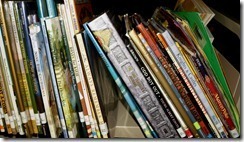 In the post, WTF is Up With Cursing in YA, agent Jennifer Laughran answers writers' questions on offensive language and its location in a manuscript.
In the post, WTF is Up With Cursing in YA, agent Jennifer Laughran answers writers' questions on offensive language and its location in a manuscript. She also points out that you'll want to make sure you're not sending a profanity-laced book to a publisher that focuses on younger-YA books or clean YA. She states that profanity can work:
Provided of course that it is right for the character, that it makes sense in context and you aren't just randomly throwing words around….cursing CAN be a lazy writer's way of making a character seem "edgy."
I write traditional mysteries, also called cozies. Use of profanity is generally discouraged in these books—it's just not what the reader is expecting or looking for when they purchase a cozy mystery.
Conversely, if a reader has chosen a novel that focuses on the harrowing day-to-day life of members of a Mafia family…they're going to be shocked if there's no profanity. That would likely be something they'd expect (especially since Goodfellas and The Godfather have conditioned us to it).
So I think reader expectations can play an important role in whether a writer should include profanity in a book. Readers are, ultimately, the people we're trying to please if we're publishing.
Some things to consider when deciding on use of profanity in your book:
Would the character ordinarily use it? Is it realistic?
Does it make sense in the context? Is it really needed in the particular situation? Could it be left out and have the scene be just as effective?
Do you have to use dialogue with the profanity, or can you just state: Kevin cursed fluently as he hit his thumb with the hammer?
Does it fit your genre? Your audience?
Could it potentially be offensive to a reader, or is it fairly mild?
Is it distracting in the text? (By its frequency, wording, etc?)
Is it gratuitous? Is it there just for shock value or does it add something (realism, character insight) to the story?
Does profanity work with your genre and your intended readers? How much is too much?
*************************
Sign up for the free, monthly Writer's Knowledge Base newsletter for writing tips and resources and to be entered in our first giveaway. Details here.
Finger Lickin' Dead launches June 7th!
May 15, 2011
You Are Already a Writer. Now Write, Dammit. by Harrison Bradlow
[image error]Being a writer is not about how many people have read your work. It is not about getting an agent who will take you on as a client (or, for that matter, who will respond to your repeated contacts). It is not even about being published. If you have passion for writing and you've ever put a pen to paper, then you're already a writer.
All those other things are nice, of course. There could be writers out there who don't dream about being on the New York Times bestsellers list, but I haven't met them yet. Being published in twenty-seven different languages, selling tens of millions of copies, and seeing your work transformed into movies starring Hollywood's A-list celebrities would all be really cool. But nobody expects that of you right out of the gate, and you shouldn't either.
I have been a voracious reader all my life, and I've always dreamed of being a published writer. Note the word "published" in there. That's where the glamour comes from, isn't it? Holding a book in your hand with your name on the front and your head shot on the back? That's what I dreamed of. I didn't stay up at night thinking about the actual writing process, which is weird, because that's really where my passion was.
And looking back, I realize that in my own way I've been a writer most of my life. Even as a kid I wrote stories, mostly just for fun. Whenever a writing assignment came up in class I'd jump on it.
I remember in fifth grade we were directed to read a book and write a story about ourselves set inside the book's world. It was a very creative assignment, actually. I chose "The Indian in the Cupboard." The story, if memory serves, was supposed to be a minimum of five pages, typed and double-spaced. Mine was thirty-something. I've searched and unfortunately cannot find a copy of it anywhere.
I've always been a writer, but I wasn't confident enough to call myself one, which is sad. I was shy about it. I didn't dare share that passion with friends or family. I didn't attend writing seminars. I didn't take writing courses in college.
I thought I had to have an agent, or be published, before I could call myself a writer. I expected way too much out of myself, much as I imagine so many others out there do too. I thought that because I didn't have my name on a cover, I wasn't really a writer.
It took actually getting my name on a cover to realize how superficial that was. I recently published my first book, a work of poetry titled If It Still Has a Head, It Isn't Quite Dead. I'll probably never forget the moment when I first held a copy of that book in my hands. Wow. It was overwhelming. But after that moment passed, I realized something I should have known all along.
Books don't make writers. Writers make books. Not having a book yet does not mean you're not a writer. It just means you're a writer who hasn't made a book yet. I didn't pick up that book and become a writer. I just picked up a book.
I've wanted to write all my life, but I didn't pursue it until very recently, thanks in large part to encouragement from my wife. I should add, I didn't even open up to her about my desire to write until long after I should have.
Why was I so afraid?
I don't know. I suppose I was afraid of being judged, afraid of failure, afraid of all the things anybody might be afraid of before doing something new. That was probably natural for me. It was also really stupid! I put off doing something I loved, and for what? Fear?
I didn't have the courage to share with my friends and family what I wanted to be until after I had that book in my hands. Can you believe that? I was publishing a book, and I didn't tell anyone. It was among the most exciting things I have done in my entire life, and I didn't tell anyone. It shouldn't have taken me so long, and if you are in a similar place to where I was a year ago, don't let it take you that long either.
Write, dammit. Set up a blog. Write poetry (it worked for me, which believe me, still boggles my mind). Write short stories. Post them online for all to see. Email them to anyone you think might read them. Solicit everyone and their mom for feedback. Grow.
In the process you'll build a fan base as well, so that once you finally do have that book in your hands, you won't be starting from scratch.
I was afraid. I can't go back and change that, but perhaps I can help some readers out there who have similar fears overcome theirs faster than it took me to overcome mine.
*******************
Harrison is a very proud first time author. He invites readers to follow him on Twitter @Harrison314 and to visit his website: www.harrisonbradlow.com. His book, If It Still Has a Head, It Isn't Quite Dead: A book of poetry on zombies, vampires, werewolves, ghosts, ghouls, and other generally scary monster-type creatures , is available online from Barnes and Noble and Amazon.com, among other outlets. Poetry excerpts from the book are available at his website as well.
May 14, 2011
Twitterific

![Terry3_thumb[1]](https://i.gr-assets.com/images/S/compressed.photo.goodreads.com/hostedimages/1380447585i/1701687.png)
Below are writing links that I've posted to Twitter in the last week.
The Writer's Knowledge Base search engine, designed by software engineer and writer Mike Fleming, makes all these links searchable—try it for searches on plotting, characterization, querying, book promo, and more.
[image error]Anyone signing up for the free Writer's Knowledge Base newsletter this month (and current subscribers) will be automatically entered in a June drawing to receive K.M. Weiland's CD (or MP3) Conquering Writer's Block and Summoning Inspiration CD . Sign up here for the web's best writing links and interviews: http://bit.ly/gx7hg1 . (You can unsubscribe at any time, and your email information is never shared.)
Hidden Treasures You Find at Conferences: http://bit.ly/m5gxwN @hopeclark
One writer's 10 steps to novel completion: http://bit.ly/mhjpl2
Staying Out of the Story: http://bit.ly/m6RIKn
202 Tips To Increase Your Blog Traffic: http://bit.ly/jXKO5C
The downside of the e-revolution in publishing: http://bit.ly/mthOYP @BSquaredInOz
Myst. Lov. Kitchen: CONSIDER THE ASPARAGUS http://bit.ly/mnYna5
Writers Are Worth It: http://bit.ly/iXavj3 @merylkevans
Starting Erotic Stories: Two Things That Work, and Two Things That Don't: http://bit.ly/kS7cD7
20 Tips for Freelance Writers: http://bit.ly/mfq4LU
Choosing Your Main Character and His/Her Essential Counterpart: http://bit.ly/m2JxUb
How Online Writers and Publishers Still Rely on Each Other for a Payday: http://bit.ly/jFVttu
Best Articles This Week for Writers 5/13/11: http://bit.ly/j8Pq0D @4kidlit
Libraries are in crisis, but literary culture is thriving (Guardian): http://bit.ly/kpt8VI
5 Questions Never to Ask at a Bookstore Reading: http://bit.ly/khdDDL
Query letters – do you have personality? http://bit.ly/ixNKSa
Viewpoint Character and the Need to Choose Wisely: http://bit.ly/mB672h
12 Easy Steps to The Making of a Book Trailer: http://bit.ly/kP5jpk
The inexorable link between Science Fiction and Fantasy: http://bit.ly/lhPLiX
20 email list-building tips: http://bit.ly/libkdP
5 Ways to Kill Your Creativity: http://bit.ly/jY4f8n
Why Writers Are So Antisocial: http://bit.ly/ketTqj
5 Fast Differences Between YA and MG: http://bit.ly/iJ5rcs
What Self-Publishing Isn't: http://bit.ly/jEdwBO
How journalists can make use of Facebook Pages: http://bit.ly/mu3QSG
5 tips for writing flash fiction: http://bit.ly/kqE4R1 @mkinberg
Why libraries still matter (Salon): http://bit.ly/mFgDsa
Should you self-publish after a near miss? http://bit.ly/mvlwjR @janefriedman
Crime writers--The Difference Between Extortion and Blackmail: http://bit.ly/j29DrU
Helpful books on writing: http://bit.ly/iqqOAR
Tackling revisions: http://bit.ly/jd1Skr
Story Structure, Part 1: Beginnings: http://bit.ly/lviwfx
Tips for finishing a book: http://bit.ly/jjiWnd
What a trendsetting book is, and isn't: http://bit.ly/ji21KE
Lessons learned from a pencil: http://bit.ly/iGK9uk
Facebook Dramatically Restricts Authors & Publishers' Ability To Host Contests: http://bit.ly/kf7B8n
Tips for confident writing: http://bit.ly/mUcp4a
The Chekhov's Gun Plot Device & How To Use It When Writing Your Novel: http://bit.ly/lq5bNj
Get More Done with Creative Quickies: http://bit.ly/mFHc8Y
Narrative Tension and the Ticking Clock: http://bit.ly/kAgdYi
Formatting red flags: http://bit.ly/isBR78
Does Your Story Have a Hook or Merely a Gimmick? http://bit.ly/kStVsh
Self-doubt and writers: http://bit.ly/l0MPPt
Best practices for finishing that book: http://bit.ly/jcoyoT @patriciastoltey
5 tips for writers who want to publish: http://bit.ly/jjiWnd @4kidlit
Five Things Writers Must Do Before They Die: http://bit.ly/iruBnZ @clarissadraper
When is it time to sign an author-agent contract? http://bit.ly/jDWHk4
"Write-by-number" Synopsis Recipe: http://bit.ly/lKETYR
Search my tweets-- http://dld.bz/KPgS
Name your protagonist: http://bit.ly/lbhZAV
Editing: It's About the Big Picture, Too: http://bit.ly/jAxb4J @authorterryo
Using Storyboard W to Structure a Self-Help Book: http://bit.ly/iXGksu
Best practices for beta readers: http://bit.ly/jPIwca
Should I Use Absolute Phrases? Absolutely: http://bit.ly/myCSVs
19 Ways to Use Images to Enhance Your Blog: http://bit.ly/it4msq
Tips for body language and description: http://bit.ly/mmylI7
Myst. Lov. Kitchen: Avery's Garlic Blue Cheese Fondue http://bit.ly/incswU
Learning to Find a Balance in Showing Versus Telling: http://bit.ly/iYXDcd @jodyhedlund
The Importance of a Literary Nemesis: http://bit.ly/jFWc99
Dumping Those Info Dumps: http://bit.ly/iIzvDt @jemifraser
How an Agent Works with a Self-Published Author: http://bit.ly/jFaD7C @galleycat
Key Story Elements: Into The Special World: http://bit.ly/moUzww
How to Get into a Subjunctive Mood: http://bit.ly/l7hpep
Ticking Clock or Option Exhaustion: 2 Ways To Bring Your Novel To A Crisis: http://bit.ly/jin0Q3
5 Key Research Sites You May Have Missed (Plus Cool Tricks): http://bit.ly/mADZQB @janefriedman
Writing Out of Order: http://bit.ly/mMQLGK
10 Simple Ways to Support Authors You Love: http://bit.ly/lSbj93
How Spelling Diverges Between American and British English: http://bit.ly/muKiEF
Synopsis Example: ''The Fly'' (Horror / Sci-Fi): http://bit.ly/lXiRm8
Mindful Writing: Accepting Failure: http://bit.ly/koiDtF
Tips for giving readings: http://bit.ly/jtw0lK
5 Common Writing Pitfalls: http://bit.ly/iQcuhF
When Characters Lie: 8 Questions to Ask: http://bit.ly/lBoWAp @CherylRWrites
Tips for Writing Picture Books: http://bit.ly/mBh3QV
5 questions that can save your book: http://bit.ly/mp2Okq
How to Practice Perseverance: http://bit.ly/lekZnq
Discouraging Decisions: http://bit.ly/jANR7P
Why traditional publishing is about more than a few weeks of chain bookstore distribution: http://bit.ly/jnestQ
10 Scifi Novels To Give People Who Hate Sci-fi: http://bit.ly/ixFEMv
Myst. Lov. Kitchen: Bacon and Buttermilk Garlic Mashed Potatoes http://bit.ly/mN9bm6
A Bookseller Who Bridges Print and Digital: http://bit.ly/l8YGRZ
Surfing the fantasy network: http://bit.ly/jyfZq3
How Many Times A Day Should You Check Your Email? http://bit.ly/lQjsip
How The Right Cover & Title Can Help Women's Fic Cast A Wider Net: http://bit.ly/irR1rc
Promo time vs writing time: http://bit.ly/mMUXPA
Royalty statements update: http://bit.ly/luh4a7
Why writing advice is utterly meaningless: http://bit.ly/makY6v
Choosing a Theme for Your Novel: http://bit.ly/iDUIF6
Blog categorizing and tagging: http://bit.ly/kusGUL
3 things one writer learned from graphic novels: http://bit.ly/lCU4ga
How to write more-the only thing you NEED to do: http://bit.ly/ljl2ft
Make your boring character a fish out of water: http://bit.ly/jr4ARq
Bringing characters together:http://bit.ly/juZrxd
A tangled plot structure: http://bit.ly/lYtSYn
How to Blog Without Comparing Yourself to Others: http://bit.ly/m690Nw
Creative Marketing for Indie Authors: http://bit.ly/kaF6ch
Beat writer's boredom: http://bit.ly/jBLa5f @clarissadraper
Why One Writer Wants Her Women's Fiction Published By A Traditional Publisher: http://bit.ly/mfenZ2
Crit partners in crime: http://bit.ly/kLlO4j
Never bring a knife to a gun fight: http://bit.ly/krbGtP
Sign up for the monthly WKB newsletter for the web's best writing links and interviews: http://bit.ly/gx7hg1
Do Plots Just "Happen"? http://bit.ly/ioqYa9
Top 7 Repeated Science Fiction Phrases or Words That Have Become Annoying: http://bit.ly/jV9QxK
9 reasons to visit your real-life setting: http://bit.ly/ji59la
Ebook Authors: 17 Great Information Sources: http://bit.ly/k9KJEp
Myst. Lov. Kitchen: HUSBAND vs WIFE: Cleo Coyle asks, "Is it a Sauce or a Soup?" http://bit.ly/llM8vB
The Joy of Booking: http://bit.ly/k03LEt
Making the most of the Kindle's "Before You Go" screen: http://bit.ly/iF1LAc
10 Ways to Create a Plot Twist: http://bit.ly/my7K0W
8 ways writers can make the most of online video: http://bit.ly/iQe4Xf
How to Avoid Freelancing Burnout: http://bit.ly/iTVBEH
The 3 ages of becoming a writer: http://bit.ly/mAkgRi @dirtywhitecandy
Creating Archetypal Characters To Fill The Dramatic Functions in Your Novel: http://bit.ly/lpcw1r
10 Ways to Totally Screw Up Your Novel: http://bit.ly/mD7nh5
Juggling parenthood and writing: http://bit.ly/mN6I6H
3 tips for writing horror: http://bit.ly/mrsNUX
Twitter For The Shy Writer—Secrets of Stress-free Tweeting: http://bit.ly/jUQaSA @annerallen
Romance novels and the dogpoo filter: http://bit.ly/k8V0BL
10 Kindle Tricks and Tweaks: http://bit.ly/kjKtLT
What Works: Promo for Ebooks: http://bit.ly/l5LBc9
Single Quotation Marks—A Reader's Question: http://bit.ly/lOjDWX
Online branding for authors--how it really works: http://bit.ly/jAlHYY
The ABCs (and Ds and Es) of Plot Development: http://bit.ly/lLXN7p
How to Become Wildly Successful at Anything: http://bit.ly/mljulE
Avoid the 3 "Tell-Tale" Signs of Self-Published Books: http://bit.ly/lAK1ca
How to quickly change a document's spacing with a single keyboard shortcut: http://bit.ly/mH1LA1
Subsidy Publishing: Proceed With Caution: http://bit.ly/m8V9Qn
The tasks of technical writing: http://bit.ly/l3KtEy
Myst. Lov. Kitchen: Mini Cherry Sponge Cakes http://bit.ly/mrGT4c
6 tips for fitting writing into a hectic schedule: http://bit.ly/jdLZqL @Sarafurlong
Metaphors vs. Similes: http://bit.ly/mI5nQ3
Weekend writer: http://bit.ly/lgsB2R
Writing--finishing what you start: http://bit.ly/jhnL2n
Happy Mother's Day, Mrs. Bennet: Jane Austen's Mothers: http://bit.ly/jd17w1
The Rise of Urban Fantasy: http://bit.ly/jpqZZG
Help for restless writers: http://bit.ly/iA6uUs
5 Reasons Why Moms Matter in Children's Literature: http://bit.ly/lzWXLv
10 essential self-editing tips: http://bit.ly/iDAMcw
Best Tweets for Writers (week ending 5/6/11): http://bit.ly/kNwBXI
How To Create A Plot Outline In 8 Easy Steps: http://bit.ly/lHq5Od
How one writer uses Scrivener to plot with flexibility: http://bit.ly/mfZypM @SarahKetley
The Dos and Don'ts of Your Online Presence: http://bit.ly/iwJmJU
The rule of 3 in fiction: http://bit.ly/lGypLz
Character building tools for writers--astrological signs: http://bit.ly/mj3qfu
Social Networking: Twitter v. Facebook: http://bit.ly/l9HUY7
5 Things to Consider Before You Spend Time Editing: http://bit.ly/m82DDG
Collaboration: 3 Rules You Can't Break: http://bit.ly/lcjecF
An Editor's Quick Tips on Submissions: http://bit.ly/iiKBkN
Creativity tweets of the week: http://bit.ly/jCxRdZ
Voice: The Right Words: http://bit.ly/mTF99f
Writing Passionate People: http://bit.ly/m1mNGT
How Self-Published Authors Found Success by Staying Local: http://bit.ly/iB6kCm @galleycat
Myst. Lov. Kitchen: Happy Mother's Day - Not Just Desserts http://bit.ly/kAEDeI
How to Build Your Twitter Tribe: http://bit.ly/kKf3Sg
The World's Best Libraries: http://bit.ly/lhXIrf
How role-playing games (RPGs) can improve your writing: http://bit.ly/k2Wkq5
How to Be a Conference Extrovert: http://bit.ly/mK7xCG
Writing an eBook: How to Get Started (and Finish!): http://bit.ly/kffCwO
Organizing a Writers Workshop: Marketing-- http://bit.ly/jlsdhr
Present tense problems: http://bit.ly/kARovC
Writers Write–Creativity Is a State of Mind: http://bit.ly/iS9HIA
The Practice of Ying / Yang Productivity: http://bit.ly/jjpsQq
4 laws of characters: http://bit.ly/jlvNJm
Narrative conflict vs narrative tension: http://bit.ly/jVsNMK
The Muchness of a YA Heroine: http://bit.ly/muI06B
Check Your Adjectives at the Door: http://bit.ly/l0uUWM
3 Edgy Little Tips to Make Your Story More Compelling: http://bit.ly/m7V8Fd
How To Meet Literary Agents and Editors on the Web: http://bit.ly/lQ6srW
An editor on the importance of good dialogue: http://bit.ly/mfWYTT
Bullying in crime fiction: http://bit.ly/lBxIFz @mkinberg
Ready to query? Step away from that send button: http://bit.ly/mkx58u
May 13, 2011
The Power of No
 What happens when you want to start taking piano lessons and art classes?
What happens when you want to start taking piano lessons and art classes?
Well, if you're Elizabeth Craig's daughter, unfortunately it means that you'll have to give up other after-school activities to take on new ones.
I decided a couple of years ago that there are absolutely wonderful moms out there who drive their children to multiple activities daily….but that I'm not one of them. :) So I 'just say no' to making my schedule even busier than it already is.
There's a limited amount of extracurricular driving that I'm willing to take on at this point. I've got my son's guitar teacher coming out to the house and I'm looking for a piano teacher to do the same.
What's more, I think that children, when they're overextended, get just as stressed out as we do. I know that I can't take a look at my calendar without wincing and I'm sure I'm not the only one.
Not everyone takes on too much…but I have a feeling that most of the writers in the online community do.
Many of us are blogging 3 or more times a week, networking on different social media platforms, volunteering for fundraisers online or in the community, working day jobs, helping care for our children or aging parents, and keeping house.
All of these things are important. But we frequently end up feeling stretched thin, even with all the things we need to do and want to do.
One thing that I'm learning to do (and it's been really hard, because I'm a people-pleaser) is to say no to additional responsibilities.
I have to protect my time pretty fiercely at this point, because there's just not very much of it to start out with. Usually, the kind of request that I get is for serving on a committee or a volunteer project at the school, etc. Again, these are very worthwhile causes. And I do help out a lot…but unfortunately, there aren't really enough people who can volunteer—so the same people tend to be picked over and over again.
Saying no:
It's much easier for me to nicely refuse (to be part of a supper club, serve on the PTA board, be part of a committee at church) if I can do it over email. That's a no-brainer—we're writers. Making a gentle refusal is easy when we're writing.
But now…I can turn down people on the phone pretty well. It took some practice to get to that point. But I now can say, "I'd really love to help out, but my schedule isn't going to permit it. I'm sorry." Or…if I'm having a weak moment, I'll ask them if I can sleep on it (and then email them the next day that I really won't be able to participate.)
I've now also had some success in turning people down in person, which for me has always been the hardest. Again, If I'm having a hard time or feeling some pressure, I'll ask if I can check my schedule and email or call them later. That gives me an opportunity to step back from the situation and come up with a polite response later on.
People might think (especially if you're at home) that you have more time than you do. They might not realize all the things (social media, promo, learning the writing craft, writing) that you're doing in a day…and they don't have to know about it. All we have to do is politely say that we really wish that we could participate, but we're just not able to.
How well do you protect your writing time and keep your schedule under control? Is it easy for you to say no?
****
Sign up for the free, monthly Writer's Knowledge Base newsletter for writing tips and resources and to be entered in our first giveaway. Details here.
Finger Lickin' Dead launches June 7th!
May 11, 2011
Launching a Book
I got an early copy of Finger Lickin' Dead via UPS on Tuesday (the book releases June 7).
Since I'm now at less than a month until the launch, I'm getting in gear for promotion. I've been more active with appearances lately, and am starting to set up stops for a blog tour.
For me, the best approach has been a combination of making appearances after the book's release and gently promoting the book via social media before the release and on the launch day.
I've tried different marketing approaches, and have found a lot of great resources online. On the Writer's Knowledge Base, you can find 234 posts on promoting your release. Here are some particularly useful posts:
How to write a press release:
Authors: How to write a press release for your book—by Alexis Grant (Always good to take press release advice from a journalist.)Book trailers:
How To Use Book Trailers Effectively—Joanna Penn's interview with Darcy Pattison
Play nice:
Ten Commandments for Book Launch Day—by Randy Susan Meyers
5 Launch Day Lessons—by M.K. Hobson
Press kits for your website/blog:
Book Marketing Part III: More on press kits—by Lavinia Thompson
Launch party:
How to Throw an Awesome Book Launch: by MoonratHow to Plan a Successful Debut Book Party—by Jody Hedlund
How to build an author page on Amazon and Goodreads:
How to build an Amazon author page and other information—by Cassander CarrUsing social media to launch your book:
HOW TO: Launch Any Product Using Social Media—by Guy Kawasaki
Promoting your book even before the sale:
27 things you can do to promote your book—Before you write it, before you launch it, and after you've published it—by Sue Collier
If you've released a book, what worked for you?
****
Sign up for the free, monthly Writer's Knowledge Base newsletter for writing tips and resources and to be entered in our first giveaway. Details here.
May 10, 2011
On Giving Readings
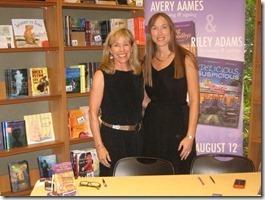 I'm one of those writers who's a real people-pleaser.
I'm one of those writers who's a real people-pleaser.
Would you like me to change something in my manuscript? A character name, the setting, a plot point? Bring a character back from the dead or kill one? I'm your girl.
Want me to talk to your book club? On the radio? Give a chat at a bookstore? I'm there.
Want me to do a reading?….No thanks. I'll ask to do something different.
I've read aloud on two occasions—and both times I was taken completely by surprise. Once I was on a panel at a bookstore event and a reader from the audience asked me to read an excerpt from my book.
"I don't read," I told her. She was a scowling older lady and she raised her eyebrows at my proclamation that I didn't read. "I mean, aloud," I said. Again with the eyebrows. "Except to my children." She looked stern. So I ended up reading my prologue. I was quite put-out.
The second time, I was on a book tour and didn't realize a reading was part of the gig. And I had to follow Avery Aames who has been a professional actress. Ugh. Let's just say that I couldn't compare. (The picture at the top of the post shows Avery and me together before last summer's event—luckily there are no pictures of the moment when I realized I'd be doing a reading. :) )
Why do I dislike readings so much? I'm just one of those people who doesn't like being read to. One of the things that will drive me up the wall is to have my hubby try and read a story out of the newspaper to me. I'll read it myself! In seconds, because I read quickly. And since I don't enjoy being read to, I'm also not wild about reading aloud, myself.
This being said, I've attended a number of events where there were readings (and couldn't escape). Here are some tips for handling readings:
Keep it short. Really short. This Galley Cat article recommends keeping the reading to three minutes.
If you don't have a microphone, speak loudly.
Use inflection when you're reading. Avery Aames honestly had the best reading I've ever heard. Did her background in television have anything to do with that? Of course! I felt almost like I was listening to a book on tape…which was much more entertaining than an ordinary reading.
If you're on a panel, be sure to listen attentively when someone else is reading their excerpt.
I'd love to be converted into a writer who enjoys readings, but I have a feeling I'm a lost cause. Any tips to win me over to them? Does anyone out there actually enjoy readings—either listening to them or giving them?
********
Sign up for the free, monthly Writer's Knowledge Base newsletter for writing tips and resources and to be entered in our first giveaway. Details here.


